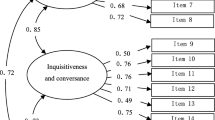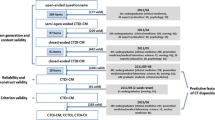Abstract
This study validated the Watson Glaser Critical Thinking Appraisal (WGCTA) on a sample of 273 private university students in Lebanon. For that purpose, evidence for construct validation was investigated through identifying the test’s factor structure and subscale total correlations, in addition to differences in scores by gender, different levels, and streams using a series of ANOVA tests. Evidence for the test’s reliability and concurrent validity was also collected. Moreover, students in five courses that emphasize critical thinking were pre–post tested using the WGCTA. Exploratory factor analysis revealed a unidimensional factor while results showed no significant differences in scores on the WGCTA between males and females or between students at different levels except for graduate students in the Business stream. Furthermore, results revealed significant differences for the senior students between different streams. Finally, results showed no statistically significant changes in the mean scores of students who were pre- and post-tested except for nursing students. The test’s significant correlations with various criterion measures provided evidence of its convergent and divergent validities. The results were discussed in terms of the nature of the construct itself, and the effects of training and effective instructional strategies on growth of critical thinking. Recommendations for future research were proposed.
Similar content being viewed by others
References
American University of Beirut (2004–2005). Course Catalogue 2004–2005. Beirut: AUB
Bauwens E.E., Gerhard G.G., (1987). The use of Watson-Glaser Critical Thinking Appraisal tp predict success in a baccalaureate-nursing programJournal of Nursing Education 26: 278–281
Beyer B.K., (1985). Critical Thinking: What is it? Social Education 49:270–276
Center for the Study of Higher Education (2001–2002). The NCTLA Assessment Institute, A Three-day Programs for Educators: Resource Notebook. Penn State University
Chipmen, S. (1989). ‘The higher order cognitive skills: what they are and how they might be transmitted’, in Sticht, T.G, McDonald, B.A., Beeler, M.J. (eds.), The Intergenerational Transfer of Cognitive Skills. Toronto, Canada: Ablex Publishing
Fisher A., Scriven M., (1997). Critical Thinking: Its Definition And Assessment. Center for research in critical thinking: Norwiche
Follman J., Miller W., Hernandez D., (1969). Factor analysis of achievement, scholastic aptitude, and critical thinking subtestsThe Journal of Experimantal Education 38: 48–53
Frederiksen N., (1994). The integration of testing with teaching: applications of cognitive psychology in instrcutionAmerican Journal of Education 102: 526–564
Gadzella, B.M. (1996). ‘Teaching and learning critical thinking skills’. Paper presented at the International Congress of Psychology, Montreal, Quebec, Canada (ERIC Document Reproduction Service No. ED 405313.)
Glock, N.C. (1995). College Level and Critical Thinking: Public Policy and Educational Reform (ERIC Document Reproduction Service No ED 298)
Holmgren B., Covin T., (1984). Selective characteristics of preservice professionalsEducation 104: 321–328
Jones E.A., Ratcliff G. (1993). Critical Thinking Skills for College Students. The Penn State University, PA: National Center on Postsecondary Teaching, Learning and Assessment. (ERIC Document Reproduction Service No. ED 358772)
Keeley S.M., Browne M.N., Kreutzer J.S., (1982). A comparison of freshmen and seniors on general and specific essay tests on critical thinkingResearch in Higher Education 13: 139–154
Landis, R.E., (1976). ‘The psychological dimensions of three measures of critical thinking and twenty-four structure-of-intellect tests for a sample of ninth-grade students’, (Doctoral dissertation, University of Southern California) Dissertation Abstracts International 37, 5705A
Logan G.H., (1976). Do sociologists teach students to think more critically? Teaching Sociology 4: 29–48
McMillan J.H., (1987) Enhancing college students’ critical thinking: A review of studiesResearch in Higher Education 26(1): 3–29
Moore B.N., Parker R., (1998). Critical Thinking. California: Mayfield Publishing Co
Nitko A.J., (2001). Educational Assessment of Students. NJ: Merrill Prentice-Hall
Olsen, S.A., (1990). ‘Examining the relationship between college core course areas and sophomore critical thinking test scores’. Paper presented at the American Evaluation Association’s Annual Conference, Washington, DC (ERIC Document Reproduction Service No. ED 328145)
Paul, R., Elder, L. and Bartell T. (1994). ‘Study of 38 public universities and 28 private universities to determine faculty emphasis on critical thinking in instruction’. Retrieved March 15, 2003 from http//: www.criticalthinking.org
Pawlowski, D.R. and Danielson M.A., (1998). ‘Critical thinking in the basic course: Are we meeting the needs of the core, The mission, and the students?’ Paper Presented at the Annual Meeting of the National Communication Association, New York (ERIC Document Reproduction Service No. ED 428410)
Pellegrino J.W., Baxter G.P., Glaser R., (1999). Addressing the “Two Disciplines” problem: linking theories of cognition and learning with assessment and instructional practiceReview of Research in Education 24: 307–352
Profinance (2003). ‘A market survey, final report’. Retrieved January 10, 2003, from http://www.aub.edu.lb
Rust J., (2002). Watson Glaser Critical Thinking Appraisal UK Edition-Manual. The Pschychological Corporation, London
Scriven, M. and Paul, R. (2003). ‘Defining critical thinking, a draft statement for the national council for excellence in critical thinking instruction’. Retrieved March 15, 2003 from http//.www.criticalthinking.org
Shepard L.A., (2000). The role of assessment in a learning cultureEducational Researcher 29: 4–14
Smith, D.G. (1981). ‘Instruction and outcomes in an undergraduate setting’. Paper presented at the meeting of the American Educational Research Association, LA
Steward, R.J. and Al Abdullah, Y. (1989). An Examination of the Relationship Between Critical Thinking and Academic Success on University Campus (ERIC Document Reproduction Service No. ED 318936)
Stratton J., (1999). Critical Thinking for College Studnets. New York: Rowman and Littlefield Publishers
Terenzini P.T., Springer L, Pascarella E.T., Nora A., (1995). Influence affecting the development of students’ critical thinking skillsResearch in Higher Education 36(1): 23–39
Tsui L., (1999). Courses and instruction affecting critical thinkingResearch in Higher Education 40(2): 185–200
Watson, G. and Glaser, E.M., (1964). Watson-Glaser Critical Thinking Appraisal Manual. Psychological Corporation
Watson, G. and Glaser, E.M. (1980). Watson-Glaser Critical Thinking Appraisal Manual. Psychological Corporation
Watson G., Glaser E.M., (1991). Watson-Glaser Critical Thinking Appraisal Manual. London: Psychological Corporation
Author information
Authors and Affiliations
Corresponding author
Rights and permissions
About this article
Cite this article
Hassan, K.E., Madhum, G. Validating the Watson Glaser Critical Thinking Appraisal. High Educ 54, 361–383 (2007). https://doi.org/10.1007/s10734-006-9002-z
Received:
Accepted:
Published:
Issue Date:
DOI: https://doi.org/10.1007/s10734-006-9002-z




